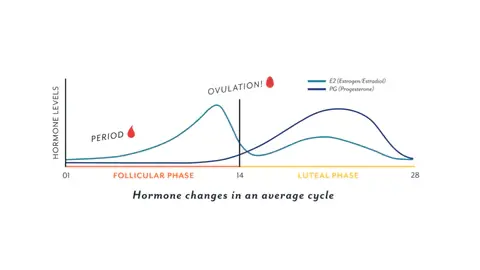The Immune System and Your Cycle
- Jessica Boyce
- Aug 20, 2023
- 3 min read

The Immune System and Your Cycle
During your menstrual cycle, hormones fluctuate. While most of us are aware that these fluctuating hormones impact ovulation, endometrial growth, and your period; it is less commonly known that they also have impacts on your immune system to ensure that fertilization could occur. There is a spike of estrogen which induces ovulation (when an egg is released from the ovary), and the luteal phase begins. During the luteal phase, estrogen and progesterone rise causing the endometrium to grow and thicken, creating a more suitable site for implantation of the fertilized egg.

When the egg is not fertilized, estrogen and progesterone levels decrease and you get your period. The thickened endometrium sheds resulting in bleeding for a few days. Then the cycle starts again. There are many studies that also show that progesterone suppresses inflammatory/immune cells. This is important during the luteal phase so that your immune system does not attack the incoming sperm or recently fertilized egg; therefore, increases the chance that implantation can occur and a fetus develops. However, this also means that anytime during the 14 days of your luteal phase (the 14 days leading up to the start of your period) your immune system is suppressed, increasing your chance of getting an infection. Once your period starts and progesterone levels drop and your immune system ramps back up again to normal levels.
Follicular phase: Day 0 to day 14
During the follicular phase, one egg matures into a mature ovum to be released during ovulation. The first 5-7 days of the follicular phase is when your period occurs. After, estrogen levels begin to rise and the uterus begins to prep for possible implantation as the endometrium begins to regrow. Progesterone levels are low during the follicular phase and your immune system is working at its full capacity.
Luteal phase: Day 14 to day 28
The spike in estrogen at the end of the follicular phase induces ovulation of the mature egg, and its release into the Fallopian tubes to travel to the uterus. Progesterone and estrogen levels rise again, causing the endometrium to grow and thicken and suppress the immune system to improve chances of fertilization and growth of a fetus. Regardless of whether you are trying to get pregnant or not, your immune system is suppressed during this phase due to the rise in progesterone.

With this, it is important to take extra precautions during the 14 days before your period starts. Washing your hands, stay up to date on recommended vaccines, exercise regularly, maintain a healthy diet, stay hydrated, get sleep, and minimize stress. These are great life practices in general, but it is good to understand when your body is more vulnerable to disease. If you find yourself getting sick often and knowing that you have hormone imbalance we highly recommend you have hormone D checked- also known as vitamin D this hormone widely impacts our cycle and the connection to our immune system. Taking your vitamin D supplement with a K2 vitamin is the best way to guarantee absorption. The more you know and the more you are aware of the way you body functions, the more you can protect your body naturally and embrace your menstrual cycle as a beautiful, intricate part of life.
Join the Movement: Empower Change!
If you're passionate about making a positive impact and supporting sustainable solutions for women's health, consider contributing to our cause. Your support helps us create informative content and spread awareness about essential topics.
Eager to learn more? Dive into our carefully curated resources that offer in-depth insights into a variety of subjects. From practical guides to inspiring stories, there's a world of knowledge waiting for you.
Share the Mission: Let's Drive Change Together
Ready to be a part of the movement? Make a donation today and join us in empowering women and fostering positive transformations. Your support matters.




Comments